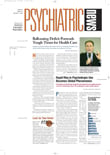Residency is a challenging and stressful time for psychiatry trainees, and many seek psychotherapy to help them cope.
“Residents are often encouraged by training directors and faculty who teach psychodynamic psychotherapy to enter individual psychotherapy for the educational value,” said Ronald Rieder, M.D., a clinical professor of psychiatry and vice chair for education at Columbia University College of Physicians and Surgeons in New York.
Yet the majority of psychiatry residents (60 percent) who completed a 51-item questionnaire in 2002 and said they had sought psychiatric treatment did so for personal reasons compared with 22 percent who said they entered psychotherapy for the educational value and 18 percent who did so for both reasons, Rieder said last month at the New York Academy of Medicine (NYAM) Section on Psychiatry 2004 Stuart Asch Memorial Lecture.
The topic of the session was residents' mental health examined from a multicultural perspective (
see article above). Rieder is also the residency training director at Columbia and the New York State Psychiatric Institute.
Seventy-four percent of the respondents who received psychotherapy sought psychotherapy treatment for the first time during residency, compared with 26 percent who said they began treatment before residency.
The survey was mailed in 2002 to all 288 psychiatry residents at a Manhattan facility in their second through fourth years of training, and 48 percent responded, according to lead investigator Sylvia Emmerich Fogel, M.D, who is with the Columbia University Center for Psychoanalytic Training and Research. The results of the study appeared in the summer American Journal of Psychoanalysis.
Fogel told Psychiatric News that the research team at Columbia excluded first-year psychiatry residents “because they do not become connected with the psychiatry department until the second year.” Also, to ensure confidentiality, residents were not asked any information that could identify them.
Residents face numerous stresses including long hours of work for low pay, increased patient responsibilities with less supervision, and fatigue, said Rieder, who described common residency stresses and responses at the NYAM program.
“Residents, especially in the first year, often feel overwhelmed, anxious, tired, apathetic, guilty when patients die, and angry at being put in this situation,” said Rieder. “In addition, their support network is disrupted because residents barely have time for their spouses or significant others.”
About two-thirds of the residents in treatment were in individual psychotherapy only, while 17 percent were in therapy and taking a psychiatric medication, and less than 1 percent were on medication only, according to Rieder. The medications that were most commonly prescribed for these residents were antidepressants, sleeping aids, and antianxiety drugs.
Psychiatry residents who completed the questionnaire believe that significantly more stigma is associated with medication use than psychotherapy, both in their training program and U.S. psychiatry as a whole, Rieder said.
He urged psychiatry faculty and training program directors to “do a better job of recognizing that residents may have serious mental illnesses such as major depression and to encourage the use of medication and psychotherapy.”
An abstract of “Personal Psychiatric Treatment Among Psychiatric Residents in Manhattan: Evidence of Stigma” can be accessed online at<www.apsa.org/japa/522/Posters-449-481.pdf> by clicking on the title. ▪
